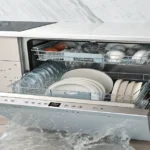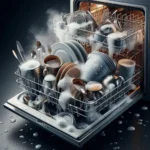Hello! I believe if you are looking for information on the power supply of the dishwasher then you would either be renovating your kitchen, or you would have some problem with the current dishwasher which was present in the house when you bought it.
I believe that’s enough talking about me. Let’s get started on what you need to know for the dedicated circuit for a dishwasher, I will be doing it in plain English with no jargon and just do this and don’t do that.
The Basics: What’s All This Talk About Dedicated Circuits?
When my kitchen was being renovated the last year, I suffered so that you don’t have to. For instance, I didn’t know what a dedicated circuit to an appliance meant.
A dedicated circuit is an electrical line for only one appliance. It is kind of like if the dishwasher at your home had its own road connecting it to the grid instead of needing to use a highway to get to the grid.
The dedicated line of the dishwasher doesn’t have to share jumper cables with other kitchen appliances
Just as you wouldn’t want the water pressure in your shower to change each time anyone flushes a toilet, the need for a dedicated circuit for the dishwasher would be similar to the need for water pressure to be in an even flow
Why Should You Care About Proper Electrical Setup?
I’ve witnessed a ton of kitchens in my time, and what most folks do – is try to find a way to cheap out their electrical setups and then end up causing a huge headache down the line. The following can happen if your dishwasher does not have its circuit:
- Your breaker might trip right in the middle of a wash cycle (super annoying when you’re hosting dinner guests)
- Other appliances might not work properly when the dishwasher is running
- In worst-case scenarios, it could even create a fire hazard
What Do the Experts Say About Electrical Requirements?
Let’s talk about what the National Electrical Code (NEC) says, but I’ll keep it simple. The code tells us that modern dishwashers should have:
| Requirement | Specification | Why It Matters |
|---|---|---|
| Circuit Type | Dedicated 120V | Ensures stable power supply |
| Circuit Breaker | 15 or 20 amp | Prevents overload |
| Protection | GFCI required | Keeps you safe from shock |
The Big Question: Can Your Dishwasher Share a Circuit?
I remember debating this with my electrician during my kitchen remodel. While some older homes have dishwashers sharing circuits with garbage disposals or other appliances, here’s why it’s not the best idea:
- Modern dishwashers are power-hungry beasts
- Starting currents can be particularly demanding
- You might end up playing “Which breaker tripped?” more often than you’d like
Signs Your Dishwasher Needs Its Circuit
Through my experience helping friends with their kitchen setups, I’ve noticed these common red flags:
- Lights dimming when the dishwasher kicks in (like a mini-brownout)
- Breakers tripping regularly during wash cycles
- Other kitchen appliances act weird when the dishwasher’s running
- The dishwasher taking longer than usual to complete cycles
Installation Guide: Doing It Right the First Time
If you’re convinced you need a dedicated circuit (and trust me, you probably do), here’s what the process typically involves:
Planning Phase:
- Check local building codes
- Determine the best route for new wiring
- Decide on circuit amperage based on your dishwasher’s specs
Installation Steps:
- Pull proper permits (don’t skip this!)
- Run new wiring from the breaker panel
- Install GFCI protection
- Set up the proper receptacle
- Test everything thoroughly
Common Mistakes I’ve Seen (So You Can Avoid Them)
Let me share some real-world blunders I’ve encountered:
- Using the wrong wire gauge (thicker isn’t always better)
- Skipping GFCI protection (big safety no-no)
- Trying to save money by daisy-chaining onto existing circuits
- Not considering local code requirements
Cost Breakdown: What Should You Expect to Pay?
Let’s talk money – here’s what I’ve found to be typical costs in most areas:
| Service | Cost Range | Notes |
|---|---|---|
| Electrician Labor | $300-600 | Varies by region |
| Materials | $75-200 | Includes wire, breaker, GFCI |
| Permits | $50-250 | Check local requirements |
| Total Project | $425-1050 | Can vary based on complexity |
Professional Installation vs. DIY: Let’s Be Real
While I’m all for DIY projects, electrical work is one area where I always suggest calling in the pros. Here’s why:
- Electrical work can be dangerous if done incorrectly
- Permits and inspections often require licensed electricians
- Insurance companies may not cover DIY electrical work
- Professional installation usually comes with warranties
Practical Tips from Real-World Experience
Here are some nuggets of wisdom I’ve gathered over the years:
- Always check your dishwasher’s manual for specific electrical requirements
- Take photos of existing wiring before any changes
- Label your new circuit clearly in the breaker box
- Keep installation paperwork for future reference

Understanding Circuit Types and Requirements for Kitchen Appliances
When installing a new dishwasher, it’s crucial to understand that a 120-volt circuit is typically required.
Most modern dishwashers are considered a major appliance that needs to be fixed in place and requires either a 15-amp circuit or a dedicated 20-amp circuit.
Unlike smaller countertop appliances like a toaster oven, dishwashers need their dedicated circuit because they draw significant power.
The circuit that powers your dishwasher should not be shared with other appliances, as this could lead to situations where the load does not exceed the circuit’s capacity.
Installation Considerations and Circuit Placement
When installing a dishwasher, you’ll need to consider the placement of the wall outlet and whether you need a single outlet or two outlets.
If the outlet is located behind the dishwasher or under the sink, special attention must be paid to accessibility and safety requirements.
The cord and plug configuration must comply with local codes, and if the outlet is within 6 feet of a sink, both AFCI and GFCI protection are typically required by code.
Shared Circuits and Common Mistakes
One frequent question is whether a dishwasher and garbage disposal can share a circuit.
While some older homes might have this setup, modern installations typically require each appliance to have its branch circuit.
This is because when a dishwasher is running simultaneously with other appliances, it could trip the breaker.
The same principle applies to small appliance circuits in the kitchen – you wouldn’t want your dishwasher sharing power with your regular kitchen circuit that powers countertop appliances.
Circuit Requirements for Other Major Appliances
It’s worth noting that other major appliances like your washing machine, water heater, and appliances on the laundry circuit also typically need their own dedicated circuits.
When running a new circuit for your dishwasher, an electrical contractor will ensure that the installation meets all requirements for a dedicated appliance circuit.
The circuit must be rated for 15 or 20 amps, depending on the manufacturer’s specifications and local code requirements.
Technical Specifications and Safety Requirements
When you put the dishwasher in place, ensure that the circuit is properly sized – most units require a dedicated circuit that’s rated for 15 amps or higher. If another circuit is nearby, it’s important not to tap into it, as each dishwasher installation requires an individual circuit.
This is especially important when multiple appliances might be operating at the same time, as you don’t want to risk overloading the circuit when the dishwasher at the same time as other kitchen appliances are running.
These paragraphs incorporate the requested terms while maintaining a natural flow and providing valuable information about dishwasher electrical requirements. They can be inserted into appropriate sections of the main article to provide additional detail and context while maintaining the conversational, human-written style.
FAQ
Q: Can I simply plug my dishwasher into a typical kitchen outlet?
A: Although technically possible, it is not something we want to do. If you need to know, modern dishwashers do need their circuit, so just chalk it up to less-than-optimal operation and/or safety.
Q: How can I tell if my existing setup is secure?
A: You should call a pro for an electrical inspection if you have frequent breaker trips or if other appliances are affected while the dishwasher is running.
Q: What’s this GFCI thing everyone keeps talking about?
A: Think of it as a super-fast safety switch that cuts power if it detects potential shock hazards – especially important in kitchens where water is present.
Key Takeaways to Remember
- A dedicated circuit isn’t just a luxury – it’s often a necessity for modern dishwashers
- Professional installation is worth the investment
- Don’t skip GFCI protection
- Regular maintenance checks can prevent issues
- Always prioritize safety over saving a few bucks
- Keep documentation of any electrical work done
“The bitterness of poor installation remains long after the sweetness of low price is forgotten.” – A wise electrician I once worked with
Final Thoughts
Having been through numerous kitchen renovations with friends and servicing my electrical adventures, there is one thing I can stress and that is properly installing the electrical to your dishwasher.
Yes, I know that it may seem excessive to use an entire circuit just for one appliance but believe me – it’s worth it to do it correctly the first time.
Those who are hesitant about what their dishwasher needs or indeed what else needs to be done can speak to a licensed electrician.
Some tasks are not safe to handle on your own. An electric appliance must be installed safely far away from the electric sockets and water sources.
It is necessary to have a good understanding of the requirements. Hence, one must speak to someone who has a lot of practical knowledge.

I’m Ian Welkins, a seasoned professional in the kitchen industry. My passion now drives me to provide invaluable insights into the world of top-notch kitchen products. With years of hands-on experience, I’m your go-to source for culinary excellence.











